Drums and Wires
Here's Aloysius, age one.
Cara and Llewellyn made a drum kit. He turns four on the 11th.
about teaching about writing about poetry
Here's Aloysius, age one.
Cara and Llewellyn made a drum kit. He turns four on the 11th.
Hi X,
A rather uneventful afternoon.
Period 4 English
I administered the reading tests and you will find the marked papers under this note. I took up all the tests and distributed them randomly for marking. The complained that they should get to decide who marks their tests but I said that they have to learn to trust each other. We started with a little discussion of symbolism and I assigned the subsets which are noted on the blank sheet that contains the tests. A good group.
Period 5 English
I went around and checked their work and all of them who were there had it done except X who didn't have his booklet with him. They read for a while and for a Friday afternoon treat I beat them at Hangman with the word 'aglet'. There were no problems and, for a Friday the day before the Semi, they were surprisingly on-task.
Thanks X for the chance to get a few hours. I have enjoyed teaching your classes and I'm sure I'll see you soon.
Hi X,
I had a great day and I appreciate the thorough notes you left me. I recorded attendance in the book and on Winschool as you asked but when a student was absent I just left it blank in the book so you could enter the number of the absence. I see that you are keeping a running total for each student. Here's how the day went:
Period 1: English
What a great class. We worked through the questions on the last page of the Study Guide as a class. We had a great discussion and I think that they have a better understanding of some of the terms (rhetoric, satire, juxtaposition, irony...), as we discussed examples from the book and from the 'real world'. Also to note that Allison copied and returned the notes you left for that purpose.
Period 2: Theory of Knowledge
Started with a discussion of Kuhn and made some connections to the History class I taught them yesterday. Essentially how the Enlightenment was a major paradigm shift and how this idea of linear progress still holds for many. The students took down the first page of notes and then we discussed each point. Sorry to not have gotten further into your notes but the discussion was good and I think that you will have a good base on which to develop the concept further as the kids seem to get it.
Period 3: Religion
You were right about this class not minding to take notes. After the first board of notes, which was the first two headings from your sheet, we discussed whether 'man' was essentially good or evil. The discussion was really good with a lot of students contributing. We never got back to the notes but I think that the class was well spent as we talked about the morality or responsibility we have to one another. So what is it that would lead one person to jump under a subway to save a stranger and another to take a picture with their phone as someone bleeds to death in the street. That kind of thing.
Lunch
- Duty . Done.
Period 4: Prep
Period 5: English
This class is a handful. I sent X out as he wouldn't shut up and was getting out of his desk. It was obvious that he was frustrating the other students. I let him after about 10 minutes but there was no repentance and I probably should have just kept him out there. Surprisingly we were able to go through all four themes on page 7 and I think that they students will do OK on their test. It's a weird mix as some of the students were really engaged and had good examples while others acted like five year olds. I have a 2.5 year old boy at home so I have lots of patience. So, in spite of the pockets of chaos we had a good review period. Also, X needed a copy of A Christmas Carol so I gave her one. The book number is 11692.
So, a good day with a fair bit of learning happening. I apologize that I didn't administer as many notes as you might have liked but I think that the discussion was valuable in both cases.
If you have any questions about my work with your classes please contact me at the coordinates below.
Cheers,
Kevin
Substitute's Report for Kevin Hehir
December 5, 2007
Hi X,
The day went well and your notes were helpful. You've got some great classes and I had a good day. Attendance was taken and submitted for all your classes. Here's a rundown:
World History
The class settled down and got done the quiz pretty a quickly so I was able to start the DVD before 9:30. I believe that we stopped at around the 34 minute mark. Uneventful and the quizzes are clipped together and will be the first bundle after this note. What was impressive was how quiet the students were when they were done. I always expect the last few writers to be finishing amid hubub but that wasn't the case. You can tell them that.
Prep
French
This class went off well too. I administered the freshly copied quiz and the class worked quietly on it. It seemed that the phrase acceuille-t-il caused some problems so you might want to review it. No problems here and the class was engaged while doing the worksheets. Nice bunch.
History
I had a good time teaching part of this group Macbeth for X last week so They were comfortable with me right away. They told me that they were on slide #109 and not #107 so we finished the unit from there. For review we just had an open jam session where I directed the students along the time-line of the Revolution and made some connections for them. I thought it would be a better way to harness their obvious verbal energy. Using their 'chattiness' for good not evil. This is a really bright group and I enjoyed teaching them once again.
Canadian History
This class was a bit harder to control. Since they weren't going to listen to the video I told them that they would have to sign and hand in their worksheets. Of course then I had to stop the keen from giving their completed sheets to the talkative. Anyway, we watched the first 20 minutes of the video twice as you asked me. I also just want to say that I had to have a little talk with X but after that he was best kind, however X's attitude threw me off and if it wasn't the last class of day I might have made more of an issue.
All in all a great day. As I mentioned above, you have some really good classes. I should also mention that even though my teachable areas are English and Tech I am very comfortable teaching History. My undergraduate degree is in Comparative Lit and Culture which is the history of ideas from Plato to NATO. I also have done straight History courses on Totalitarianism, 20 th C History and American History (with a tilt towards the antebellum era). I also have an interdisciplinary Masters Degree in the Humanities where I took two History courses at the graduate level.
Thanks again, if you have any questions about my work with your students you can contact me at the coordinates below.

Thursday, November 29, 2007
English
I administered the inclass essay and there were no problems aside from the expected whining about the idea that they may actually expected to demonstrate that they have read the material. There was a general unfamiliarity with the word 'secular' so I defined it for them. Also, as you predicted, I had to explain the questions to X. Once the tests were passed out the class worked silently and when students were finished they respected the others who were still writing.
As with the class above there was a group kvetch about having to do the test. But, once I passed out the tests they got down to business. I gave out copies of A Christmas Carol and recorded the numbers on the sheet provided. There wasn't much time left in class so I introduced who Dickens was and the rise of 'people's art' in the 19thC. We had a very good discussion about the role of art in our common lives – empathy & escapism ... You can tell the class that I enjoyed our little discussion and I appreciated that they were able to listen to their classmates.
I just followed your game plan and we had a good class. I filled in a few blanks and suggested where a certain term might be helpful on a test. The presentations were very thorough and the reception was positive. We got through questions #5, 7, and 9. So, #10 is still left to do. FYI – they picked their Secret Santa at the beginning of class.
 I've got a contract with the Eastern Edge Gallery, an artist run centre that I think is the creative heart of the city. Here is a photo from the first of what will be a series of workshops where high school students will come down the gallery to meet a professional artist and make some art.
I've got a contract with the Eastern Edge Gallery, an artist run centre that I think is the creative heart of the city. Here is a photo from the first of what will be a series of workshops where high school students will come down the gallery to meet a professional artist and make some art.



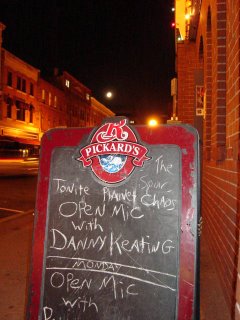 (An exerpt of this interview was published in Thursday, November 2,2006 issue of The Current. I highly recommend this amazing article by Greg Locke, I think that local media has been giving His Danness a free ride and Greg clouds the matter with a few facts.)
(An exerpt of this interview was published in Thursday, November 2,2006 issue of The Current. I highly recommend this amazing article by Greg Locke, I think that local media has been giving His Danness a free ride and Greg clouds the matter with a few facts.)
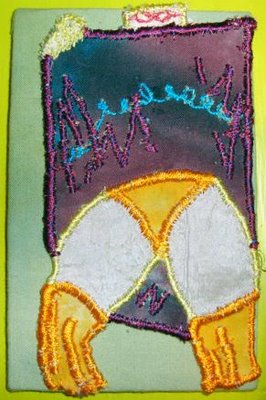 I'm not sure if anyone looks here but if you are reading this, let me suggest that you go and have a look at Cara's new show Vast Uplifters. You can go down to the Rogue Gallery in the Eastern Edge Artist Run Centre and see the work live until Friday, October 6. Or, you can see the show on her blog until, like, forever.
I'm not sure if anyone looks here but if you are reading this, let me suggest that you go and have a look at Cara's new show Vast Uplifters. You can go down to the Rogue Gallery in the Eastern Edge Artist Run Centre and see the work live until Friday, October 6. Or, you can see the show on her blog until, like, forever.
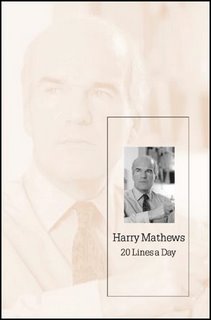
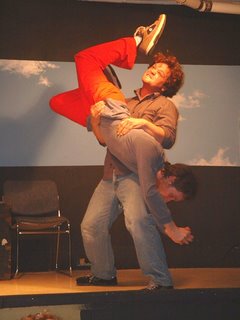 Weapons of Mass Distraction. 9:00pm Thursday, August 17, 24. Rabbittown Theatre at the corner of Merrymeeting Rd. & Linscott St. / 709 739 8220. $5.
Weapons of Mass Distraction. 9:00pm Thursday, August 17, 24. Rabbittown Theatre at the corner of Merrymeeting Rd. & Linscott St. / 709 739 8220. $5.Published in The Current on August 17, 2006.

Here's how this works.
i have always been interested in parataxis and how we read.
Effective literacy draws on a repertoire of practices that allow learners, as they engage in reading and writing activities, to:
Of course. I could end it there but I have had some conversations with colleagues about this and I seem to come across some pretty bad writing in my travails. First off, in the spirit of disclosure, I don't spell very well. For instance, I will need the spell checker to spell necessary correctly. But, I have never let not knowing how to spell a word stop me from using it. And, I certainly haven't let not knowing what it means stop me either. But that's a vanity thing. Anyway, when I'm writing a test (which I'm doing a fair bit of for this program and I hadn't done in six years) I will always have a crack at it and put (sp?) next to it. Now for a test, I don't expect to be marked down but I would expect it to be noted as well as any other mistakes in spelling. But, tests are a bit different. There are other anxieties at play there.
Bob's Poetic Byway
This site features a unique Glossary of Poetic Terms, plus Examples of Poetic Terms from the works of prominent poets, Tips for the Enjoyment of Poetry and A selection of Bob's Poems. Also, you will find helpful links to relevant poetic, literary, and reference websites.
Writenet
http://www.twc.org/forums/index.html
WriteNet: an unbelievably valuable resource for writers and teachers interested in teaching imaginative writing. Spend some time looking at this web-site -- enjoy our exclusive interview series, learn how real-life artists-in-residence teach imaginative writing, and more!
Canadian Student Writing Contests and Resources
http://www3.sympatico.ca/susanio/WWCcomp.html
The Claremont Review: The International Journal of Young Adult Writers
http://www.theclaremontreview.com/
How to Sew a Chapbook
http://www.wildhoneypress.com/BOOKS/Stitching%20Brochure.pdf
Poetry Experiments
http://epc.buffalo.edu/authors/bernstein/experiments.html
Compiled by Charles Bernstein from Bernadette by Poets' Ludicrously Aimless Yearning (PLAY). Dispense only as appropriate and under the supervision of an attending reader. Individual experiments are not liable for injury or failure resulting from improper use of appliance. Any profits accrued as a direct or indirect result of the use of these formulas shall be redistributed to the language at large. Management assumes no responsibility for damages that may result consequent to the use of this material in educational institutions or individual writing projects.
Lost in Translation
http://www.tashian.com/multibabel/
What happens when an English phrase is translated (by computer) back and forth between 5 different languages?
Tiger of luminous that is burned of the tiger

Here are four fantastic photos taken by my brother Conor. Of course they could be used as writing prompts or for reminding students that the educational grass is a similar green wherever you go. Or is it?

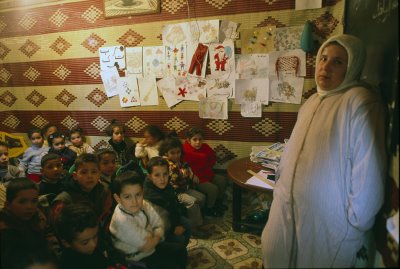


Clever Manitoban poet Dennis Cooley calls a metaphor "a Greek taxi". I like that.
Taken from student essays and found at
Every year this comes around and every year it's great.
A green lowland of pianos
Here are a few of the things I might be reflecting on in the future:
My dad sent me this. Thanks Dad!
I am Kevin
To know is to utilize information. If thinking is a physical phenomenon then knowledge is the game ball. It is the basic building block for decision making. It is a commodity that can be given or kept. Sold or stolen. There are many metaphors to mix. We have different theories of knowledge. Different people will ask different questions. Foucault says that knowledge is power. I agree. In an age when we can’t beat our students, knowledge may be the only hope for classroom containment.
Teachers are front line civil servants who have two masters. As part of the ideological state apparatus they are contracted to deliver services and information (knowledge) vetted and sanctioned by the provincial government. The other master is the collective expectation of parents and students. The two masters live miles apart, spatially and figuratively but manage to exert pressure on the teacher.
If you get paid to teach in the public system then you don’t get paid to be a social worker, a coach, a truant officer, a computer technician and a parent. I also think that teachers get a bad rap in the press. I saw in Ontario, during the late 90s, a provincial Tory government vilify teachers in the press in what was clearly a union busting move. I don’t think the profession ever recovered.
Changing provincial governments makes teaching prone to drastic shifts in social programming. The plumbing industry doesn’t just make all plumbers learn new tools and abandon old ones as some kind of expensive experiment. Plumbers also don’t find out about decisions that affect their livelihood on the NTV News. Even the poor fish plant workers are called to the plant for the bad news.
Every parent has had some schooling and has had experiences with teachers. Can you ever out live them? I’ll bet a lot of parents bring bad memories of teachers to parent-teacher night. That doesn’t happen with bus drivers.
I think society put a lot of pressure on teachers without fully understanding what they do. In fact I’m not even sure yet what they do exactly. Classroom teachers are really at the end of a very large and politicized bureaucracy. Kids bring complicated environments to school with them every morning and teachers work for a system that they are publicly at war with. And they should have a strong union. And be well paid.
My family has just moved. There is a subsidized housing project directly behind us called Buckmaster Circle. I know from my previous work experience as an educational researcher that completion of high school is rare for the young people of that neighbourhood.
Now, do I send my children to the neighbourhood school where the culture of finishing school isn’t supported in the students’ homes? Or, do abandon my own community and place my children in a school where I know the parents share the same socio-cultural values as me? By sending my children to another school I rob my own, local community of an involved parent and the school of children exposed to a much broader worldview.
As some one who claims to be committed to community development I know that this issue will present an ethical dilemma for my family. This reminds me of the sentiment of British singer Billy Bragg who sings, “Do I vote Green for my children or Red for my class?”
I will have to decide whether I will invest in my own community/school.
Here are some resources that might be useful to the English teacher on the go. All comments are my own.
Quite simply the best organization for resources for teaching imaginative writing to K-12 students. While the major focus of T&W is putting poets in schools they have also published over 60 books on all aspects of teaching writing. The website offers lesson plans, interviews, book reviews and the opportunity to join writenet; an international, online community of over 800 language arts teachers. The site is well organized and easy to navigate.
Published bimonthly, six times a year by the American Association for the Advancement of Science. This is a good guide to what kinds of resources are being produced in the world of science. It has a Features section with Best Books, Best Films and Best Software. The regular sections cover other trends and areas. For someone without a background in science this journal is valuable as its contributors are experts in the field. This is especially valuable when building a library of information books.
Published bimonthly. This is a well laid out journal about the size of The Downhomer. Special issues cover particular areas of children’s literature so the back issues may be worth checking out if you have a particular interest. The latest issue is about the graphic novel so that tells me that they are current and believe that all literature is worth a critical going over. Organizationally, the large Review section compliments Columns and Features sections.
Canadian Children’s Book NewsPublished quarterly by the Canadian Children’s Book Centre. Janet McNaughton is on the Board of Directors and that’s cool. The largest section is We Recommend. This is good for keeping abreast of what’s going on in Canadian children’s letters.
Children’s Technology ReviewPublished quarterly. As a Tech Ed teacher I will become the defaultsoftware ‘recommender’ if I ever get to work in a school. What makes this journal valuable is the reviews from the students who test the software and hardware. I found the language very accessible and not too jargon heavy. It is also nice that free back-issues are available for the cost of shipping.
Appraisal: Science Books for Young People (wonky link)
This is a great journal that Wade from our class turned me onto. It is published quarterly by The Children’s Science Book Review Committee. What makes this journal unique and valuable is, what one might call, a parallel reviewing procedure. Every book is reviewed by a Librarian and a Specialist. The former evaluates the language and format of the book while the latter evaluates the science.
The Alan Review is published three times a year by The Assembly on Literature for Adolescents. It is a peer reviewed journal that covers every aspect of teaching literature to young adults. The website is a cluttered mess but the articles are archived and searchable, so there is some value to it.
This biannual journal is written for and by academics. I read a twenty page editorial about the future of theory in the field of literature for children. This is for teachers who miss graduate school. But, if you, like me, see literature as a social phenomenon then some of the stuff here may be of interest. You may find an article about the Disneyfication of children’s literature called “Hegemony Cricket”, but probably not.
Book Links: Connecting Books, Libraries, and ClassroomsThis monthly magazine lists the grade level that the particular articles are intended for below each title. This is a great organizational feature. The magazine has a wide variety of very practical material which would be valuable to teachers, parents and librarians. The generalist nature of Book Links makes it good value for the price as it has many audiences.
This website is maintained the League of Canadian Poets. There are two sections; one for teachers and one for students. There are a lot of resources and ideas for teaching poetry to your students. The archive of sound files is quite well organized too. The digital history of Canadian verse is the most concise and inclusive I’ve ever seen.
